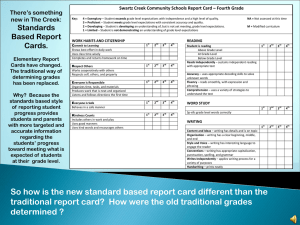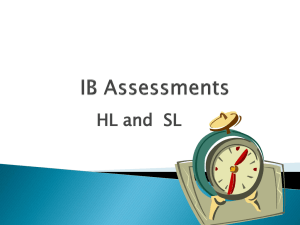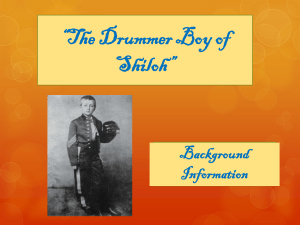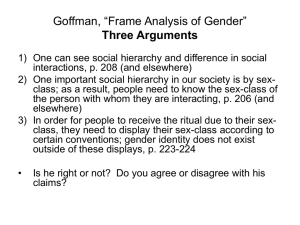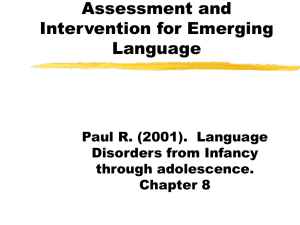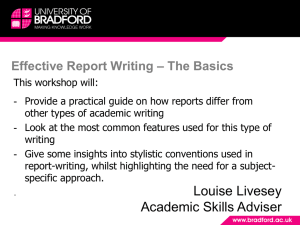ELA Scoring Process - practice and rubric
advertisement
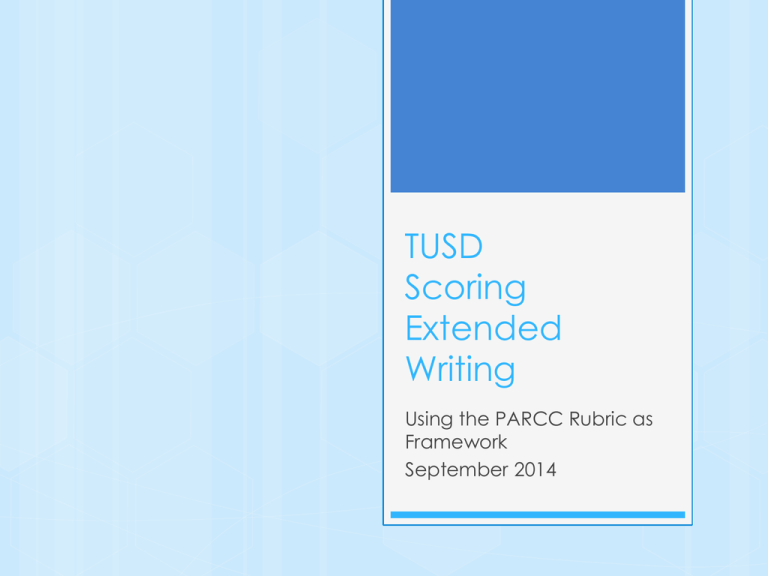
TUSD Scoring Extended Writing Using the PARCC Rubric as Framework September 2014 Outcomes Describe the components of the ELA Writing Rubric Grades 6-12: Scoring Rubric for Analytic Writing Score Point = 4 Score Point = 3 • Provides an accurate analysis of text’s explicit & inferential content Shows Comprehension • Cites convincing of Source Text textual evidence Ideas/Details for the analysis • Provides an accurate analysis of text’s explicit & inferential content • Cites textual evidence to support the analysis Score Point = 2 • Has a mostly accurate analysis of text’s explicit & inferential content • Cites textual evidence to support the analysis • Shows a basic • Demonstrates • Shows extensive comprehension of full comprehension of the text’s ideas comprehension the text’s ideas of text’s complex ideas Score Point = 1 Score Point = 0 • Has a minimally • Has an inaccurate accurate analysis of analysis of text’s text’s content content • Cites some textual • Shows a little to no evidence for the comprehension of the analysis text’s ideas • Shows a limited comprehension of the text’s ideas Grades 6-12: Scoring Rubric for Analytic Writing Score Point = 4 Score Point = 3 • Provides an accurate analysis of text’s explicit & inferential content Shows Comprehension • Cites of Source Text convincing Ideas/Details textual evidence for the analysis • Demonstrates full comprehension of text’s complex ideas • Provides an accurate analysis of text’s explicit & inferential content • Cites textual evidence to support the analysis Score Point = 2 Score Point = 1 • Has a minimally • Has a mostly accurate analysis of accurate analysis of text’s content text’s explicit & inferential content • Cites some textual evidence for the • Cites textual evidence to support analysis the analysis • Shows a basic • Shows extensive comprehension of comprehension of the text’s ideas the text’s ideas • Shows a limited comprehension of the text’s ideas Score Point = 0 • Has an inaccurate analysis of text’s content • Shows a little to no comprehension of the text’s ideas Grades 6-12: Scoring Rubric for Analytic Writing Score Point = 4 • Addresses the prompt Own Ideas Developed in the Written Response • Effectively develops the claim, topic, narrative • Has convincing details, reasoning & text-based evidence appropriate for task, purpose & audience Score Point = 3 • Addresses the prompt • Develops the claim, topic or narrative Score Point = 2 • Addresses the prompt Score Point = 1 • Addresses the prompt • Develops a claim, • Develops a claim, topic or narrative topic or narrative minimally • Uses details, reasoning somewhat • Uses limited details, & text-based evidence reasoning & evidence appropriate for the task, • Uses details, reasoning & textthat is only limitedly purpose & audience based evidence appropriate for the task, somewhat purpose & audience appropriate for the task, purpose & audience Score Point = 0 • Is underdeveloped • Is inappropriate for the task, purpose & audience Grades 6-12: Scoring Rubric for Analytic Writing Score Point = 4 • Addresses the prompt Own Ideas Developed in the Written Response • Effectively develops the claim, topic, narrative • Has convincing details, reasoning & text-based evidence appropriate for task, purpose & audience Score Point = 3 • Addresses the prompt • Develops the claim, topic or narrative Score Point = 2 • Addresses the prompt Score Point = 1 Score Point = 0 • Addresses the prompt • Is underdeveloped • Develops a claim, • Develops a claim, topic or narrative topic or narrative minimally • Uses details, reasoning somewhat • Uses limited details, & text-based evidence • Uses details, reasoning & evidence appropriate for the reasoning & textthat is only limitedly task, purpose & based evidence appropriate for the task, audience somewhat purpose & audience appropriate for the task, purpose & audience • Is inappropriate for the task, purpose & audience Grades 6-12: Scoring Rubric for Analytic Writing Score Point = 4 Organization of the Written Response Score Point = 3 • Is purposefully • Is mostly clear, coherent clear, coherent and and cohesive cohesive • Has a conclusion and • Has a strong introduction intro and conclusion • Has a logical progression of ideas that • Has a logical facilitate understanding progression of the writer’s position ideas that facilitate understanding the writer’s position Score Point = 2 Score Point = 1 Score Point = 0 • Has some clarity, • Has limited clarity, • Has a lack of coherence and cohesion clarity, coherence coherence and cohesion and cohesion • Leaves the writer’s • Has a conclusion progression of ideas unclear and introduction • Has a logical grouping of ideas that makes the writer’s view discernable but not obvious Grades 6-12: Scoring Rubric for Analytic Writing Score Point = 4 Organization of the Written Response Score Point = 3 • Is purposefully • Is mostly clear, coherent clear, coherent and and cohesive cohesive • Has a conclusion and • Has a strong introduction intro and conclusion • Has a logical progression of ideas that • Has a logical facilitate understanding progression of the writer’s position ideas that facilitate understanding the writer’s position Score Point = 2 Score Point = 1 Score Point = 0 • Has some clarity, • Has limited clarity, • Has a lack of coherence and cohesion clarity, coherence coherence and cohesion and cohesion • Leaves the writer’s • Has a conclusion progression of ideas unclear and introduction • Has a logical grouping of ideas that makes the writer’s view discernable but not obvious Grades 6-12: Scoring Rubric for Analytic Writing Score Point = 4 • Establishes & maintains an Clarity of effective style & Language tone in the Response • Uses precise language consistently (sensory details, descriptive words and phrases, transitional and linking words, domain-specific vocabulary Score Point = 3 Score Point = 2 • Establishes & maintains • Establishes & an effective style & tone maintains a mostly effective style • Uses mostly precise language (descriptive • Has some precise words & phrases, sensory words & phrases, details, transitional and sensory details, linking words, domaintransitional and specific vocabulary linking words, domain-specific vocabulary Score Point = 1 Score Point = 0 • Uses a style that has a • Has an limited effectiveness inappropriate style • Uses limitedly • Uses little if any descriptive words & phrases, sensory details, descriptive transitional and linking language words, and domainspecific vocabulary Grades 6-12: Scoring Rubric for Analytic Writing Score Point = 4 • Establishes & maintains an Clarity of effective style & Language tone in the Response • Uses precise language consistently (sensory details, descriptive words and phrases, transitional and linking words, domain-specific vocabulary Score Point = 3 Score Point = 2 • Establishes & maintains • Establishes & an effective style & tone maintains a mostly effective style • Uses mostly precise language (descriptive • Has some precise words & phrases, sensory words & phrases, details, transitional and sensory details, linking words, domaintransitional and specific vocabulary linking words, domain-specific vocabulary Score Point = 1 Score Point = 0 • Uses a style that has a • Has an limited effectiveness inappropriate style • Uses limitedly • Uses little if any descriptive words & phrases, sensory details, descriptive transitional and linking language words, and domainspecific vocabulary Grades 6-12: Scoring Rubric for Analytic Writing Score Point = 4 • Strongly commands the conventions of standard English Knowledge consistent with of effective editing Writing Conventions • Despite a few minor errors in grammar & usage, the meaning is clear throughout Score Point = 3 • Has command of the conventions of standard English consistent with edited writing Score Point = 2 • Has spotty command of the conventions of standard English consistent with editing • May have a few distracting of errors in grammar/usage but the • May show a pattern meaning is clear overall of grammar & usage errors that at times impedes understanding Score Point = 1 Score Point = 0 • Has limited command of the conventions of standard English consistent with editing • Has little to no command of the conventions of standard English • Has many distracting errors in grammar & usage that at times impede understanding • Has frequent distracting errors in grammar & usage, often impeding understanding Grades 6-12: Scoring Rubric for Analytic Writing Score Point = 4 • Strongly commands the conventions of standard English Knowledge consistent with of effective editing Writing Conventions • Despite a few minor errors in grammar & usage, the meaning is clear throughout Score Point = 3 • Has command of the conventions of standard English consistent with edited writing Score Point = 2 • Has spotty command of the conventions of standard English consistent with editing • May have a few distracting of errors in grammar/usage but the • May show a meaning is clear overall pattern of grammar & usage errors that at times impedes understanding Score Point = 1 • Has limited command of the conventions of standard English consistent with editing Score Point = 0 • Has little to no command of the conventions of standard English • Has frequent • Has many distracting distracting errors in errors in grammar & usage that grammar & usage, at times impede often impeding understanding understanding 9th-10th Grade Argument Text PROMPT: Write an argumentative essay in which you make a case for the speaker whom you think makes the strongest argument to promote racial equality. Consider each speaker’s use of claims, counterclaims, reasons, evidence, and methods when making your determination. Individually, read the text from Students A score the writing based on the 6-12 Grade Rubric criteria. Table Discussion Review and discuss your scores for each construct. You have reached consensus if you are within a point. The higher score prevails. Reflection Answer the following on a sticky note and post on the “Questions” poster before you leave. What questions do you have regarding the ELA rubric? What questions do you have regarding the scoring process?
